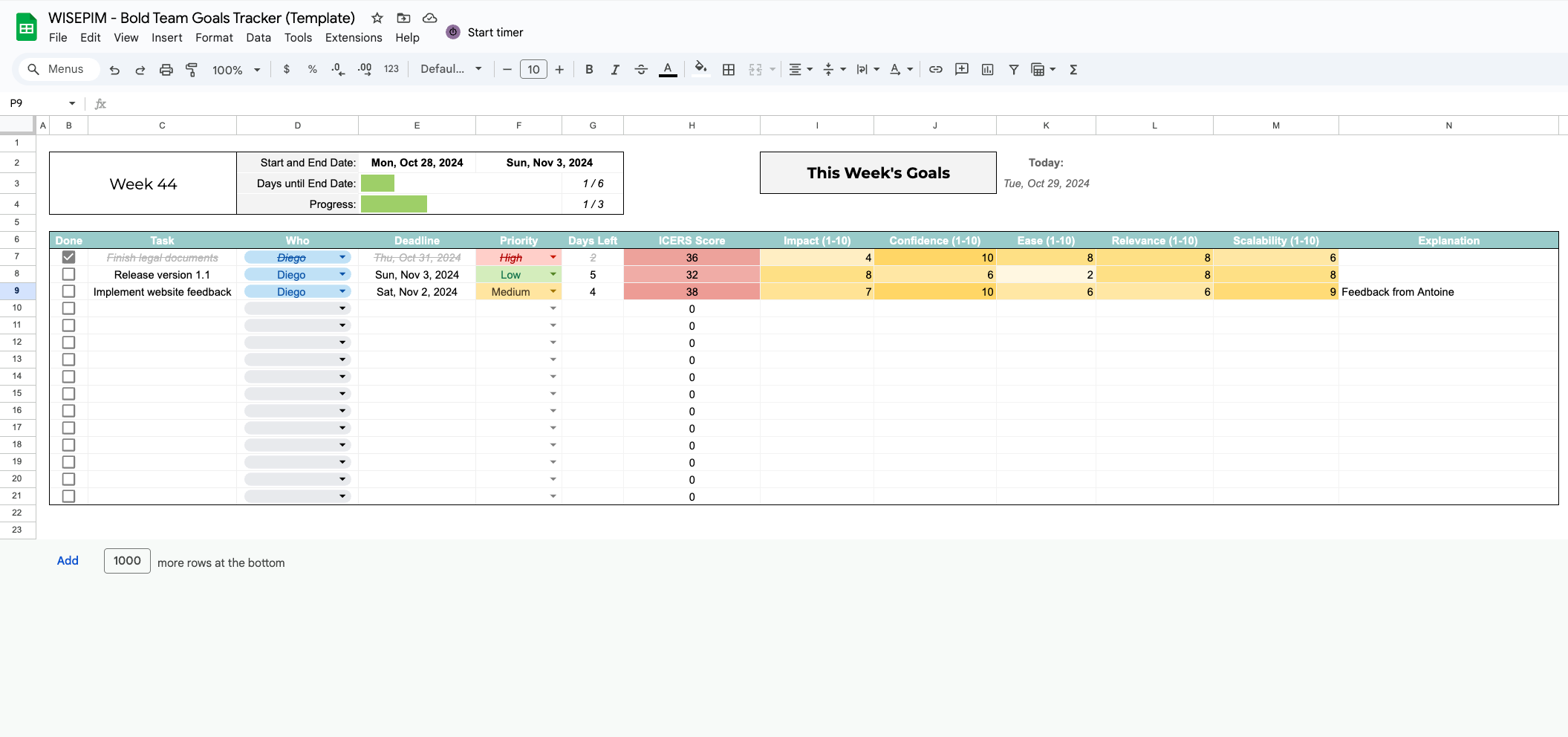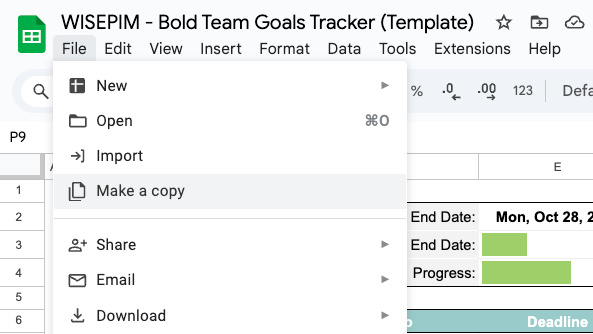How we do Goal Setting as a Team (with free Google Sheets Template)
Discover how we use the ICERS framework for weekly goal setting, combining impact, confidence, ease, relevance, and scalability. Plus, get our Google Sheets template with visual progress tracking and conditional formatting. Try it today!

Hello, team players! Today, we're thrilled to share our weekly goal-setting process that's been a game-changer for our team. We use a variant of the OKR (Objectives and Key Results) approach, combined with the ICERS framework, and a handy Google Sheets template to keep us on track. Let's dive into how we do it!
The ICERS Framework: Our Secret Weapon
Every Monday during our sprint and management team meeting, we evaluate tasks using the ICERS framework. Here's how we score each task based on five crucial factors, each on a scale of 1 to 10:
- Impact: How much will this task improve our business, product, or user experience?
- Confidence: How confident are we in our ability to successfully complete this task?
- Ease: How difficult is this task to implement, considering time and resources?
- Relevance: How well does this task align with our current business goals and user needs?
- Scalability: How well can this solution scale as our user base or usage grows?
The total ICERS score is the sum of these individual scores, out of a possible 50. This score helps us prioritize tasks and ensures we're working on initiatives that truly move our business forward, both in the short and long term.
Our Weekly Goal-Setting Process
- Brainstorm tasks and initiatives for the upcoming week.
- Evaluate each task using the ICERS framework.
- Prioritize based on total ICERS score, aiming for a mix of high-leverage tasks and quick wins.
- Track progress using our Google Sheets template.
- Review and adjust priorities as needed throughout the week.
Tips for scoring tasks
- Be honest and realistic with your scoring.
- Encourage discussion and consensus among team members.
- Consider both quantitative and qualitative data when scoring.

How to Interpret ICERS Scores
Of course the main focusses should be the ones with the highest total score, but there is some more granularity when deciding which ones to tackle first. If two tasks have a similar score you can think about this:
- High Impact & High Ease (Quick Wins)
- High Impact & High Confidence (High Leverage)
- High Relevance & High Scalability (Strategic Initiatives)
Our Google Sheets Template
To streamline our goal-setting process, we've created a Google Sheets template. Here's what you can expect:
- Weekly Sheets: We copy our template sheet to create a new sheet every week, allowing us to keep track of our progress and priorities throughout the year.
- Visual Progress Tracking: A simple, color-coded system to quickly see task status at a glance.
- Conditional Formatting: Automatically highlights cells based on score values, making it easy to identify high-impact tasks.
- Data Validation: Ensures scores are within the 1-10 range and provides a dropdown menu for task status.
Types of Tasks we typically include
In our weekly ICERS goal-setting process, we ensure we're balancing strategic, operational, and tactical tasks to drive our business forward. Here's a breakdown of the types of tasks we typically include:
Business Tasks:
These are initiatives focused on improving our internal processes, enhancing our company culture, or supporting our overall business strategy. Examples include:
- Creating a detailed business plan for the quarter.
- Improving our project management process.
- Developing a new training program for team members.
- Conducting market research to inform our product roadmap.
Product Development Tasks:
These are tasks directly related to building, improving, or maintaining our products. They often involve working on new features, fixing bugs, or enhancing existing functionalities. Examples include:
- Designing and implementing a new user onboarding flow.
- Developing an API integration with a third-party service.
- Refactoring code to improve performance and maintainability.
- Conducting user testing to gather feedback on a new feature.
Quick Wins:
Sometimes, we include tasks that may not have a massive long-term impact but can still provide value in the short term. These tasks help us maintain momentum and celebrate small victories along the way. Examples include:
- Creating a social media post to engage with our audience.
- Updating our website with new content or resources.
- Sending a customer survey to gather feedback.
Get Your Hands on Our ICERS Goal Setting Template
Ready to try the ICERS framework and our Google Sheets template for your team? We'd be happy to share it with you! Click below to subscribe to our newsletter and gain instant access to the template.
Subscribe Now & Get the ICERS Template

Once you've subscribed, you'll get an email with the link to the Google Sheet, you can then create a copy to use it yourself. We're excited to see the amazing things your team will achieve with ICERS!
Happy goal setting, and here's to a productive week ahead! 🎯🚀
October 29, 2024

CTO and Co-Founder at WISEPIM, building AI-powered solutions that transform product data management for e-commerce businesses. Over 10 years of experience solving complex technical challenges in e-commerce and PIM systems.